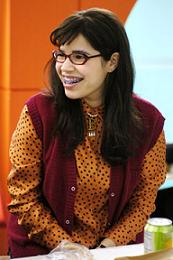 Since the first episode of ABC’s winning new comedy “Ugly Betty,” the conflict has become more and more evident between the family-centered, ethnically diverse life of Betty Suarez–who lives in Queens with Dad, Sis, and Nephew–and the (almost) all-white (both in decor and skin-tone), ultra-materialistic world of Manhattan’s “Mode Magazine,” where Betty works by day. Viewers are treated weekly to the contrast between the warm, friendly, genuineness of Betty’s life at home and the sleek, but unbelievably back-stabbing, superficial workspace and staff that fills the magazine’s desks and pages.
Since the first episode of ABC’s winning new comedy “Ugly Betty,” the conflict has become more and more evident between the family-centered, ethnically diverse life of Betty Suarez–who lives in Queens with Dad, Sis, and Nephew–and the (almost) all-white (both in decor and skin-tone), ultra-materialistic world of Manhattan’s “Mode Magazine,” where Betty works by day. Viewers are treated weekly to the contrast between the warm, friendly, genuineness of Betty’s life at home and the sleek, but unbelievably back-stabbing, superficial workspace and staff that fills the magazine’s desks and pages.
Last night’s episode, “After Hours,” features Betty’s big chance to actually write for “Mode.” She gets the opportunity by spending a weekend at a boutique hotel that is up for review. (The assignment is in sharp contrast to her usual work, like picking up boss Daniel’s dry-cleaning or ironing out–pun intended–his sexual fiascos with the many women who share his bed at night.) The growing tension between Betty’s aspirations to make it in the magazine world and to remain true to her roots were never more evident.
Only after Betty reveals to the hotel staff that she is there from “Mode” do they treat her with any respect–a fact she seems to have learned not to take to heart, or at least pretends not to notice. And though we see Betty reveling–at least at first–in the ultra-luxe suite that is hers for the weekend, the unlimited spending budget for food, massages, and anything her heart desires, among other exciting perks–not least of which involves enjoying these freebies all in the name of getting her first byline–Betty gradually comes to the realization that she doesn’t really belong in this world. (This discovery is made with a little help from her off-and-on-again boyfriend from Queens, who pays a rather disastrous visit to her suite.) Toward the end of the episode we see Betty traipsing sadly and slowly back to her family’s house, all her initial excitement about the assignment muffled in the suitcase dragging behind her.
The show even finishes with Daniel telling Betty that, though she has written a fantastic review, her “normal girl” perspective on the hotel is not something “Mode” could actually print. Instead, a feminist-leaning magazine for “real women” picks up her piece because it’s fabulous.
What’s interesting about “Ugly Betty” is how the show captures what so many of us struggle with: the temptations of the glamorous world we see on television, on the red carpet, and in the glossy pages, many of which we long to experience at least once in life, at odds with the simple realities and pleasures of family, neighborhood, and friends, which can’t be bought with money or occupation. Betty’s character is such a mix of desire for this kind of success, yet at the same time, she refuses to relinquish her roots and what’s really important to her–despite the temptations she experiences on a daily basis.
Will this continue to be Betty’s leaning as the show progresses? Will she opt for family and roots over glitz and superficially? Or will the temptation become to great? Hopefully the show will have enough staying power with viewers so we can watch to find out.

